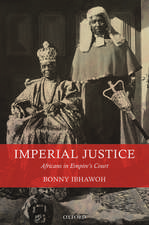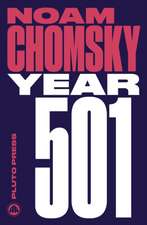The Long Process of Development: Building Markets and States in Pre-industrial England, Spain and their Colonies
Autor Jerry F. Hough, Robin Grieren Limba Engleză Paperback – 29 apr 2015
| Toate formatele și edițiile | Preț | Express |
|---|---|---|
| Paperback (1) | 357.13 lei 6-8 săpt. | |
| Cambridge University Press – 29 apr 2015 | 357.13 lei 6-8 săpt. | |
| Hardback (1) | 680.44 lei 6-8 săpt. | |
| Cambridge University Press – 19 noi 2014 | 680.44 lei 6-8 săpt. |
Preț: 357.13 lei
Nou
Puncte Express: 536
Preț estimativ în valută:
68.34€ • 74.21$ • 57.41£
68.34€ • 74.21$ • 57.41£
Carte tipărită la comandă
Livrare economică 22 aprilie-06 mai
Preluare comenzi: 021 569.72.76
Specificații
ISBN-13: 9781107670419
ISBN-10: 1107670411
Pagini: 460
Ilustrații: 2 b/w illus. 4 tables
Dimensiuni: 152 x 229 x 24 mm
Greutate: 0.61 kg
Editura: Cambridge University Press
Colecția Cambridge University Press
Locul publicării:New York, United States
ISBN-10: 1107670411
Pagini: 460
Ilustrații: 2 b/w illus. 4 tables
Dimensiuni: 152 x 229 x 24 mm
Greutate: 0.61 kg
Editura: Cambridge University Press
Colecția Cambridge University Press
Locul publicării:New York, United States
Cuprins
1. Introduction; 2. The collective-action difficulties of creating an effective state; 3. The pre-state of England and Spain: the importance of man-made geography; 4. The early state in England and Spain; 5. The minimally effective state; 6. The truly effective state; 7. English and Spanish colonial policies; 8. The English colonies; 9. Colonial Mexico; 10. The collective-action problems of the formation of the United States; 11. The collective-action problems of the formation of Mexico; 12. The implications for development theory.
Recenzii
'To better to understand today's developing world, Hough and Grier turn to history. Argument after argument, point after point, they demonstrate the benefits of doing so. This study adds to the legacy of North, Olson, Acemoglu and Robinson, all of whom have turned to the study of political history in an effort to comprehend the economics of development.' Robert Bates, Eaton Professor of the Science of Government, Harvard University
'How exactly does colonial history shape the subsequent economic development of a nation? The Long Process of Development is the best and deepest treatment of this question that has been penned.' Tyler Cowen, George Mason University
'Economists and policy makers have ignored the time it takes to foster substantial change in informal institutions that are a sine qua non for economic development and political stability. Synthesizing the classic works of Douglass North, Mancur Olson and Max Weber, Grier and Hough add a temporal factor that illuminates the slow pace to the modern world.' David D. Laitin, Watkins Professor of Political Science, Stanford University
'To my knowledge, this book is the first, and surely the first serious, attempt to confront the transactions costs-based approaches of Olson and North with the evolved-order approaches of Hayek and Buchanan. The result is a book of signal merit, explaining both the politics of economic development and the economics of political development.' Michael C. Munger, Duke University
'A development narrative that has both the historical long-view and the granularity of the particular. Their insights will be valuable to all students of development - and a healthy antidote to the fad panaceas of the day.' Lant Pritchett, Harvard University
'It may sound obvious and trite, yet it is the most underappreciated fact of comparative development: constructing effective states takes time - a very long time. As Jerry Hough and Robin Grier show, the process took more than four centuries in England and Spain. Their analytical history sheds light on why the norms and practices that sustain modern states require long periods of gestation to become solidly entrenched. This is a book with critical implications for today's state-building efforts in the developing world. It warns us not to expect miracles and teaches us that chance, contingency and time all play a larger role than we typically allow.' Dani Rodrik, Institute for Advanced Study, Princeton
'How exactly does colonial history shape the subsequent economic development of a nation? The Long Process of Development is the best and deepest treatment of this question that has been penned.' Tyler Cowen, George Mason University
'Economists and policy makers have ignored the time it takes to foster substantial change in informal institutions that are a sine qua non for economic development and political stability. Synthesizing the classic works of Douglass North, Mancur Olson and Max Weber, Grier and Hough add a temporal factor that illuminates the slow pace to the modern world.' David D. Laitin, Watkins Professor of Political Science, Stanford University
'To my knowledge, this book is the first, and surely the first serious, attempt to confront the transactions costs-based approaches of Olson and North with the evolved-order approaches of Hayek and Buchanan. The result is a book of signal merit, explaining both the politics of economic development and the economics of political development.' Michael C. Munger, Duke University
'A development narrative that has both the historical long-view and the granularity of the particular. Their insights will be valuable to all students of development - and a healthy antidote to the fad panaceas of the day.' Lant Pritchett, Harvard University
'It may sound obvious and trite, yet it is the most underappreciated fact of comparative development: constructing effective states takes time - a very long time. As Jerry Hough and Robin Grier show, the process took more than four centuries in England and Spain. Their analytical history sheds light on why the norms and practices that sustain modern states require long periods of gestation to become solidly entrenched. This is a book with critical implications for today's state-building efforts in the developing world. It warns us not to expect miracles and teaches us that chance, contingency and time all play a larger role than we typically allow.' Dani Rodrik, Institute for Advanced Study, Princeton
Notă biografică
Descriere
This groundbreaking book examines the history of Spain, England, the United States, and Mexico to explain why development takes centuries.
















